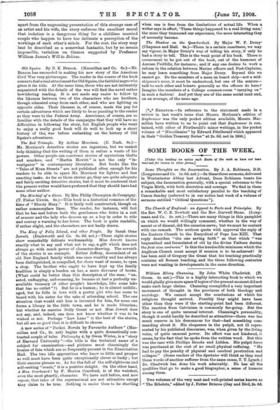The King of Folly Island, and other People. By Sarah
Orne Jewett. (Duckworth and Co. 3s. 6d. net.)—These eight stories show remarkably delicate workmanship. Miss Jewett knows exactly what to say and what not to say, a gift which does not always go with much power of character-drawing. The seventh of the stories is an example. Esther Jaffrey, descendant of an old New England family which was once wealthy and has always been distinguished, is compelled, for sheer want of means, to open a shop. The brother who ought to have kept up the family tradition is simply a burden on her, a mere devourer of books. (What could be better than this description of the man : " un_ sated, unflagging, unforeseeing, he became at last a perfectly un- available treasury of other people's knowledge, like some lake that has no outlet " ?) But he is a human ; he is almost middle_ aged, but he falls in love with a pretty girl who has come to board with his sister for the sake of attending school. The one situation that would suit him is invented for him, for some one forms a library in the little town, and he is made librarian; but whether he marries Nelly Grant or not Miss Jewett does not say, and, indeed, one does not know whether it was to be wished or not. Perhaps " Law Lane " is the best of the stories, but all are so good that it is difficult to choose.
A new series of " Pocket Novels by Favourite Authors " (Mac- millan and Co., 2s. net) begins with a quite dramatically con- trasted couple of tales. Philosophy 4, by Owen Wister, is a "story of Harvard University "—the title is the technical name of a subject for examination—and pictures most charmingly the ironies of fate which are so frequently present in the Examination Hall. The two idle apprentices who know so little and prosper so well must have been quite exceptionally clever or lucky ; but their success pleases us. As for the fall of the self-righteous and self-seeking "coach," it is a positive delight. On the other hand, A Man Overboard ! by F. Marion Crawford, is of the weirdest, even the most ghastly, character. We have said before, and now repeat, that tales of the supernatural are not attractive except they claim to be true. Nothing is easier than to be startling
when one is free from the limitations of actual life. When a writer says in effect, 'These things happened to a real living man,' the more they transcend our experience, the more interesting they of necessity become.






















































 Previous page
Previous page